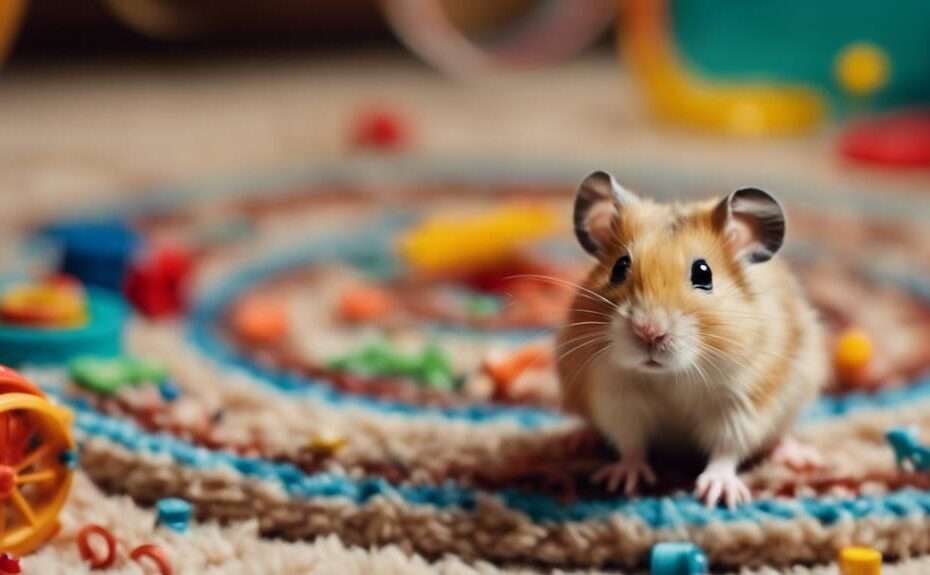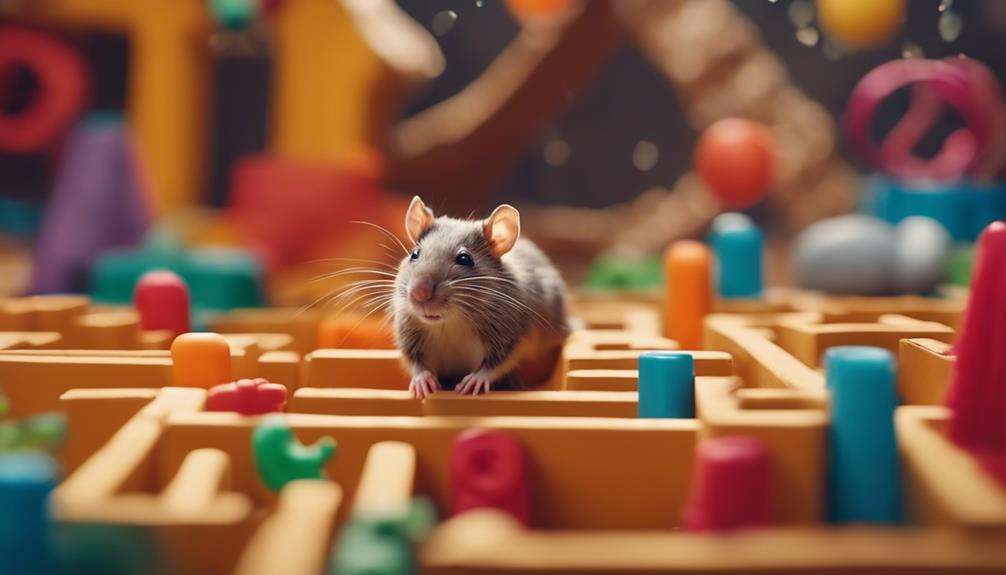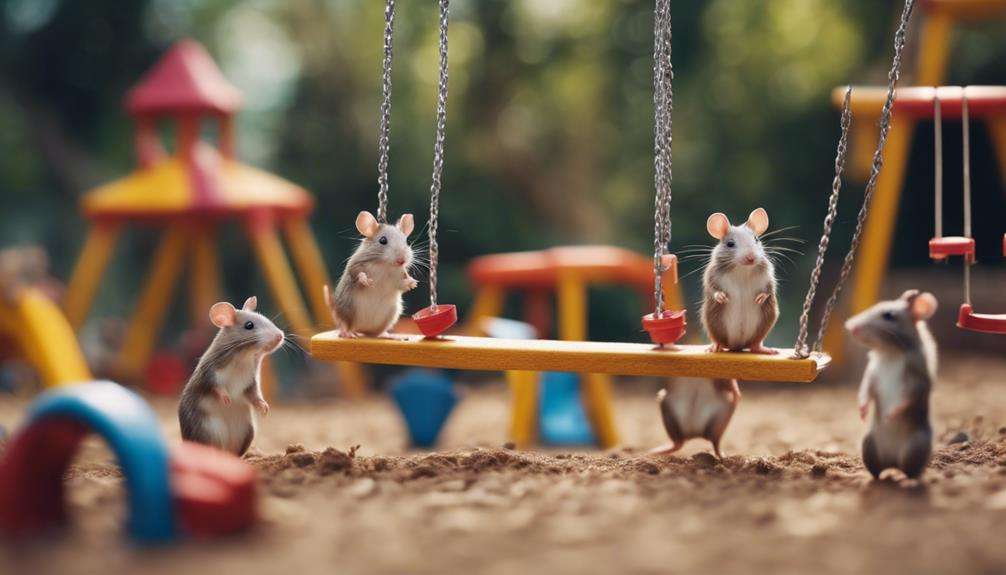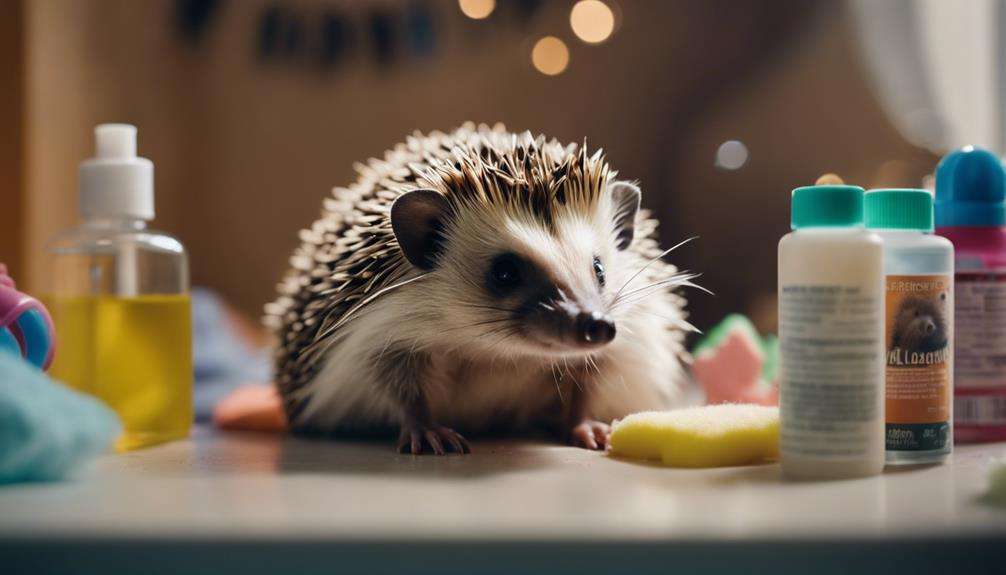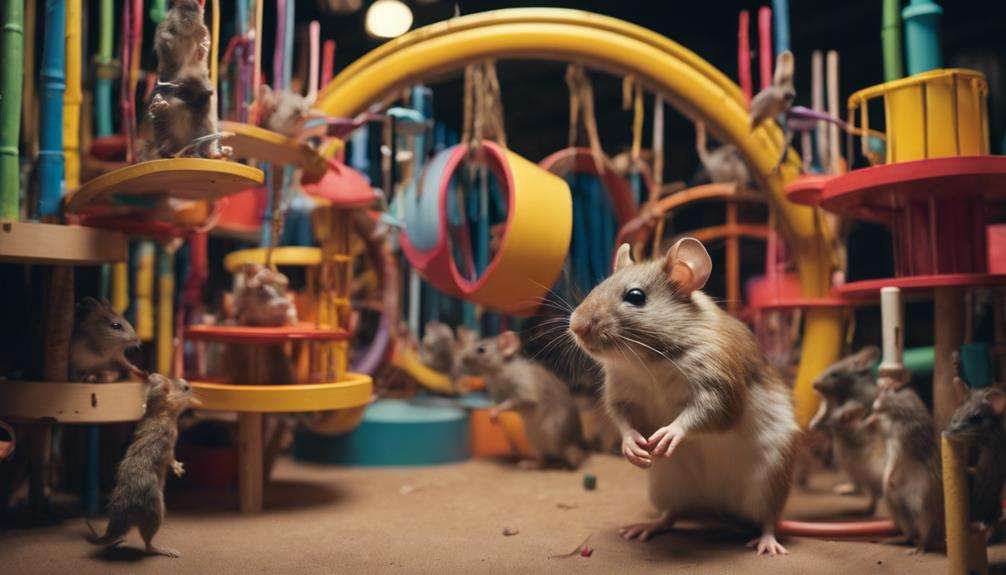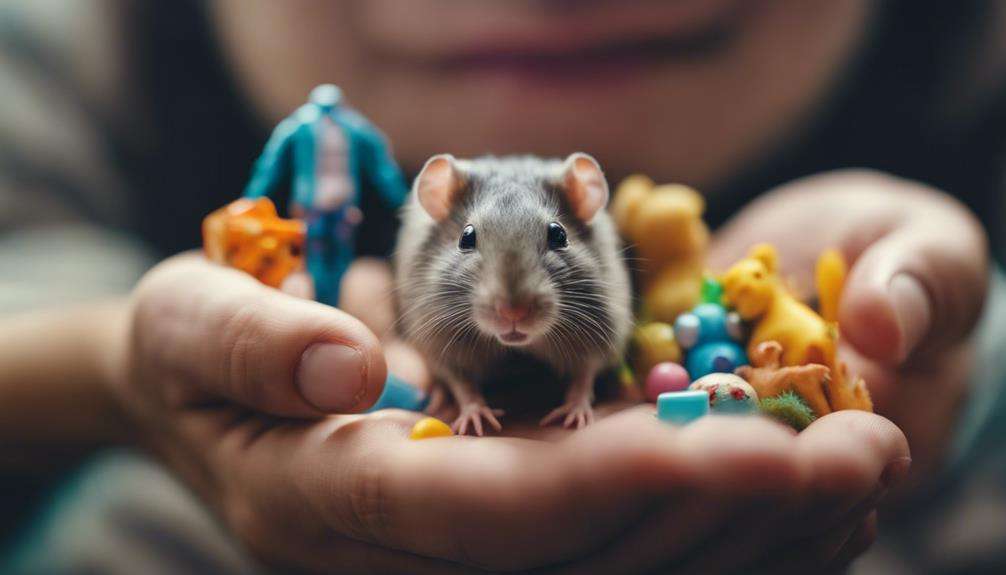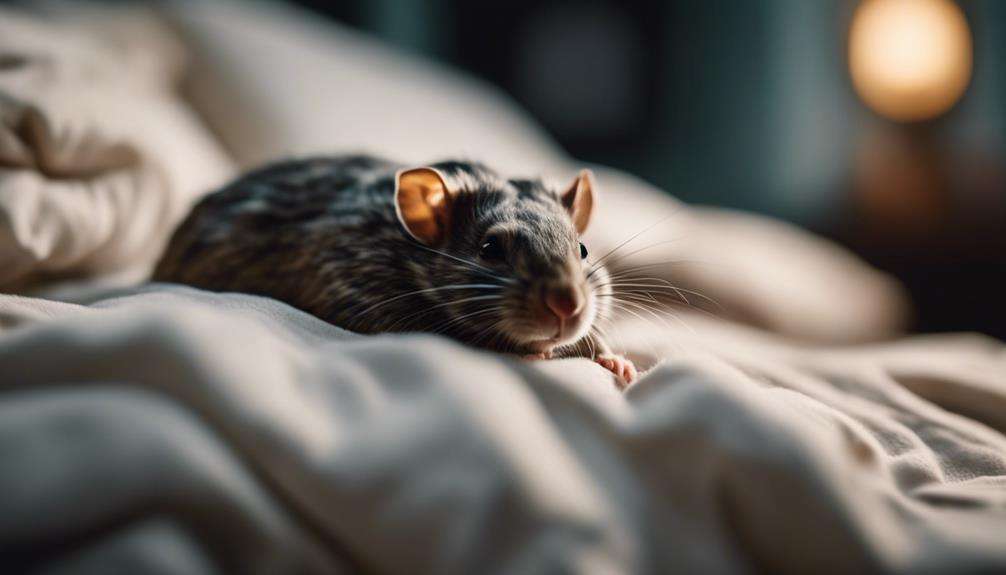Do you know that pet rodents have unique personalities and behaviors that require specific care and attention? Understanding how to handle these quirky little creatures can make a significant difference in their well-being and your relationship with them.
From learning about their temperament and the right socializing techniques to providing mental stimulation and a safe environment, there are various tips and tricks to help you navigate the world of pet rodents successfully.
Stay tuned to discover how you can ensure a happy and fulfilling life for your furry friend.
Key Takeaways
- Gentle and patient handling builds trust and minimizes stress in quirky pet rodents.
- Use treats to create positive associations with handling sessions for better interactions.
- Regular socialization prevents unwanted behaviors like biting and encourages natural behaviors.
- Enrich the environment with toys and activities to keep quirky pet rodents mentally stimulated and happy.
Rodent Temperament and Behavior
Have you ever wondered why some pet rodents are more social and outgoing while others are shy or skittish? Just like people, pet rodents have unique personalities that influence how they interact with their environment. Socialization plays a crucial role in shaping your rodent's behavior. By providing an enriched environment with hiding spots, toys, and opportunities for exploration, you can help reduce stress and encourage natural behaviors.
Gentle handling is key to building trust and confidence in your pet rodent. Approach them calmly and speak softly to create a sense of security. Pay attention to their body language, vocalizations, and habits to better understand their needs and preferences. Regular interaction and positive experiences will help strengthen your bond and enhance your pet's overall well-being.
Handling and Socializing Techniques
When handling your pet rodents, remember to be gentle and patient, as this helps build trust and minimizes stress.
Regular socialization sessions are crucial to prevent unwanted biting behaviors and foster positive interactions.
Treats can be a great tool to create a positive association with handling, making the experience enjoyable for your quirky little companions.
Gentle Handling Methods
To handle pet rodents gently, consider utilizing different methods such as the scoop and claw techniques to ensure their comfort and trust. The scoop method involves lifting rats by placing your hands on their sides, providing a less threatening approach. Employ the claw method by supporting their back and swiftly placing them on a solid surface for added comfort. Avoid using the scruff method with adult rats, as it can lead to trust issues and discomfort if their back legs aren't supported. Remember never to pick up rats by the tail base to prevent injuries and distress. Use the luring method with treats to encourage rats to jump onto your hand, building trust and familiarity without causing stress.
Approach your pet rat calmly and speak softly to reassure them. Spend time bonding with your rat through gentle strokes and positive interactions. Create a safe and enriched environment for your pet rat to thrive.
Encouraging Social Interactions
Begin socializing your pet rodent by gently and confidently handling them, aiming to build trust and minimize stress during your interactions. Regular socialization through positive experiences like treats, playtime, and gentle petting can encourage bonding.
Ensure the cage is a safe and comfortable space for your rodent to retreat to when needed. Use slow movements and soothing tones to create a calm environment during handling sessions. Offering treats or rewards can reinforce positive behavior and make handling more enjoyable.
Gradually increase the duration and frequency of handling sessions to help your rodent become more comfortable with human interaction over time. Consistent care, patience, and understanding their needs will foster a strong bond between you and your quirky pet rodent.
Enrichment and Mental Stimulation
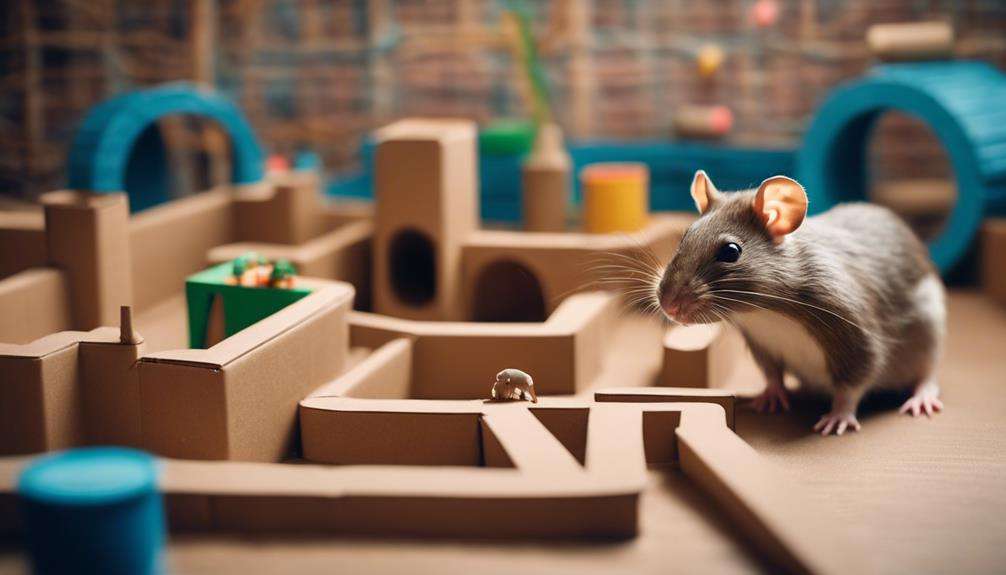
You can enhance your pet rodents' mental well-being by providing a variety of engaging toys like tunnels, ladders, and puzzle feeders. Rotating these toys regularly will prevent boredom and encourage exploration and problem-solving skills.
Introducing puzzle feeding toys can also stimulate their minds and keep them mentally active and alert.
Toys for Enrichment
For pet rodents, incorporating a variety of toys such as tunnels, ladders, and hammocks is essential to provide both physical and mental stimulation.
Puzzle feeders and foraging toys are great for encouraging natural behaviors and preventing boredom in your furry friends.
Chew toys made of safe materials help wear down your rodent's teeth and prevent overgrowth, ensuring their dental health is in check.
Remember to rotate toys regularly to maintain interest and prevent habituation in your pet rodents.
DIY toys like cardboard tubes, paper bags, and nesting materials offer inexpensive enrichment options and allow you to get creative in keeping your pets mentally stimulated.
Your little companions will thank you for the engaging environment you provide!
Rotating Cage Accessories
Incorporating rotating cage accessories like hammocks, ropes, and tunnels is crucial for providing enrichment and mental stimulation to your pet rodents. These accessories not only prevent boredom but also keep your furry friends engaged and curious about their surroundings.
By introducing new toys and items periodically, you can promote exploration and physical activity in your pet rodents. The variety of textures, shapes, and sizes in these cage accessories encourage natural behaviors and provide a stimulating environment. Regularly changing the cage setups and accessories mimics a natural habitat, leading to behavioral enrichment.
Enriching your pet rodents' cage with rotating accessories can help reduce stress, increase activity levels, and ultimately enhance their overall well-being.
Puzzle Feeding Toys
To engage your pet rodents' natural foraging instincts and promote mental stimulation, puzzle feeding toys offer an enriching way to keep them active and entertained. These toys provide mental stimulation and enrichment for pets by encouraging problem-solving skills and physical activity. They reduce boredom and promote overall well-being.
Rodents enjoy the challenge of extracting treats or food from various compartments within the puzzle toy, keeping them engaged and happy. Puzzle feeding toys can also help prevent obesity and behavioral issues in pet rodents by keeping them mentally stimulated and physically active.
Introducing different types of puzzle toys can offer variety and ensure your pet rodent remains mentally stimulated and entertained.
Creating a Safe Environment
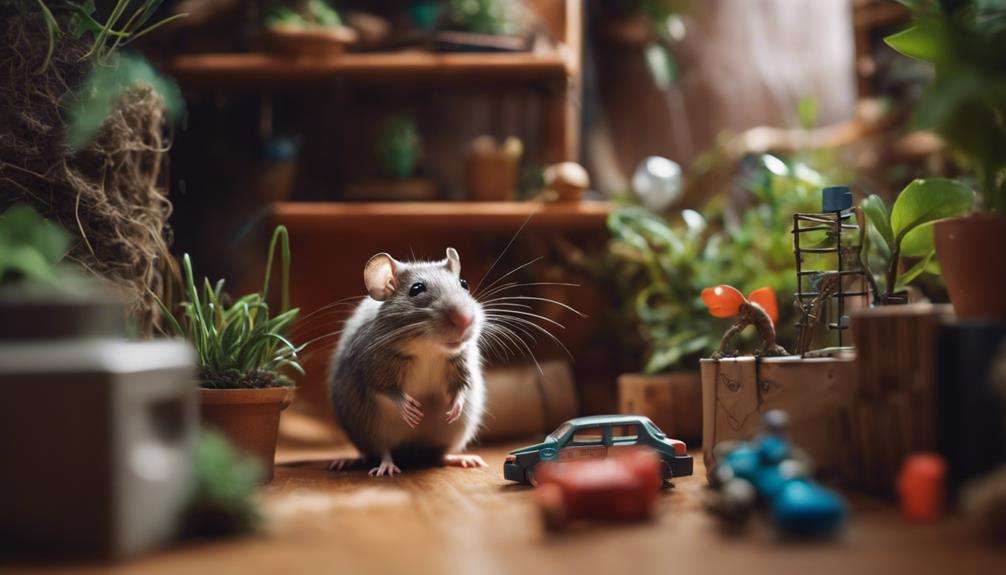
Creating a safe environment for your quirky pet rodents is crucial to ensuring their well-being and overall happiness. To care for your pet properly, start by ensuring the cage is escape-proof with secure latches and no gaps for rodents to squeeze through. Remove any hazards like sharp objects, toxic plants, or small items that your rodents could ingest accidentally.
Provide hiding spots and tunnels to help them feel secure and reduce stress levels. Make sure to use non-toxic, chew-safe materials for toys, bedding, and cage accessories to prevent any harm. Additionally, monitor the temperature and humidity levels in your rodent's environment regularly to maintain their overall well-being.
Health Monitoring and Care
Ensuring the health and well-being of your pet rodent involves closely monitoring their behavior, appetite, activity levels, and appearance for any signs of illness. Here are some tips on caring for your pet rodent's health:
- Spend Time Bonding: Interacting with your rodent regularly not only strengthens your bond but also allows you to notice any changes in their habits or demeanor quickly.
- Tips on Caring for Specific Breeds: Different rodent species have unique care requirements. For instance, a Syrian hamster may need more space and exercise compared to other smaller rodents.
- Regular Veterinary Check-ups: Just like any other pet, your rodent should have routine check-ups to catch any potential health issues early on.
Diet and Nutritional Needs
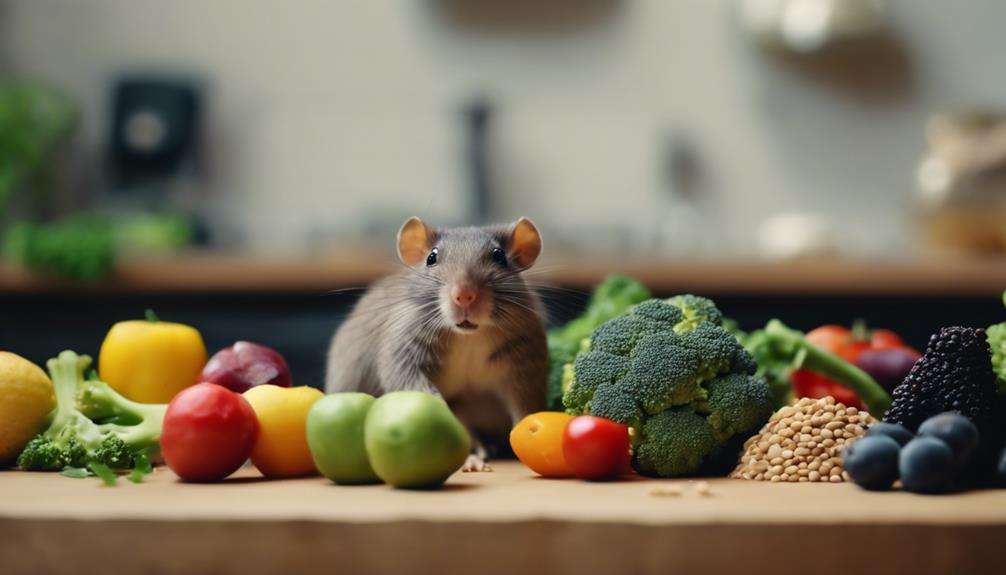
Monitoring your pet rodent's diet and nutritional needs is essential for their overall health and well-being. Rats should be fed a high-quality pelleted rat food to ensure balanced nutrition, supplemented with daily servings of fresh fruits and vegetables.
It's important to avoid feeding them chocolate, corn, candy, caffeinated beverages, cheese, and sticky foods to prevent potential health issues. Instead, focus on incorporating foods like peas, broccoli, carrots, apples, and bananas into their diet to provide essential vitamins and minerals.
While it may be tempting, limit human food treats to prevent obesity and help your pet rodent maintain a healthy weight. Additionally, always ensure fresh water is readily available to keep your pet rodent hydrated and support their overall health.
Grooming and Hygiene Practices
To ensure your pet rodent's well-being, maintaining proper grooming and hygiene practices is crucial for their health and comfort. Here are some essential tips to keep your furry friend clean and healthy:
- Regularly groom your pet: Spend quality time gently brushing your rodent's fur to prevent matting and maintain cleanliness. This not only keeps their coat in good condition but also strengthens the bond between you and your pet.
- Check and trim nails: Keep an eye on your rodent's nails and trim them if they get too long. Overgrown nails can cause discomfort or even lead to injuries, so regular nail maintenance is essential for their well-being.
- Provide a dust bath: Offer your rodent a dust bath, like a chinchilla dust bath, to help them keep their fur clean. Dust baths aren't only enjoyable for rodents but also aid in preventing skin issues.
Frequently Asked Questions
How Do You Handle Pet Rodents?
When handling pet rodents, approach them gently with the scoop method, avoiding tail lifting. Use the claw method for comfort and security or the luring method for trust-building. Be cautious with the scruff method to prevent discomfort.
What Is the Best Practice When Touching Pet Rodents?
When touching pet rodents, remember to use proper handling techniques. Start by bonding with them through gentle strokes on their back or sides. Set boundaries by avoiding sensitive areas. Building trust takes time and patience.
What Is the Best Rodent Pet for Handling?
For handling, rats are the best choice among rodents. They enjoy interaction, can be trained for tricks, and form strong bonds. Provide enrichment activities, proper housing, and use training techniques to enhance your rat's well-being.
What Is the Friendliest Rodent Pet?
When looking for the friendliest rodent pet, guinea pigs stand out. Their gentle nature and love for interaction make them great companions. With proper care, attention, and socialization, they thrive in pairs and enjoy bonding activities.
Conclusion
Congratulations on becoming a rodent whisperer! By following these top tips, you have unlocked the secret to a harmonious relationship with your quirky pet rodents. Your dedication to their well-being and happiness is truly commendable.
Remember, you aren't just a pet owner, you're a rodent guru! Keep up the fantastic work and watch as your furry friends thrive under your expert care. You're a rodent handling superstar!
